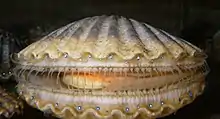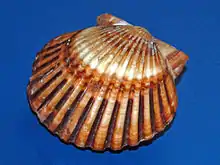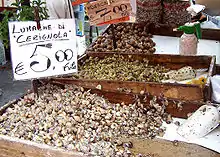Argopecten irradians
Argopecten irradians, formerly classified as Aequipecten irradians, common names Atlantic bay scallop or bay scallop, is a marine bivalve mollusk in the family Pectinidae, a species of scallop. An edible saltwater clam, it is native to the northwest Atlantic from Cape Cod to the Gulf of Mexico.
| Argopecten irradians | |
|---|---|
 | |
| A live Argopecten irradians | |
| Scientific classification | |
| Kingdom: | Animalia |
| Phylum: | Mollusca |
| Class: | Bivalvia |
| Order: | Pectinida |
| Family: | Pectinidae |
| Genus: | Argopecten |
| Species: | A. irradians |
| Binomial name | |
| Argopecten irradians (Lamarck, 1819) | |
| Subspecies | |
|
See text | |
Description

Bay scallop fishery
This species of scallop used to support a large wild fishery on the East Coast of the United States, but since the 1950s it has decreased greatly. This is apparently the result of several negative influences, one of which is a reduction in sea grasses (to which bay scallop spat attach) due to increased coastal development and concomitant nutrient runoff. By contrast, the Atlantic sea scallop (Placopecten magellanicus) is at historically high levels of abundance,because the Magnuson-Stevens Fishery Conservation and Management Reauthorization Act of 2006 put a limit on catch numbers and lead to a recovery from overfishing.
Scallops aquaculture is currently being practiced in Florida[1] They were introduced into China for the 1980s and are the basis of a vibrant aquaculture industry in that country[2] and attempted elsewhere.
Subspecies
This species has five different subspecies:
